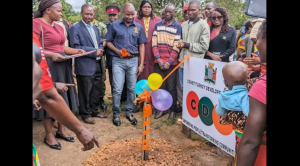Government has launched the Drought In Displacement (DID) Research Project aimed at tackling the effects of the drought.
Speaking during the launch, Lusaka Mayor Chilando Chitangala said the DID research project marks a critical turning point in Zambia’s efforts to support vulnerable citizens.
Ms Chitangala states that this will address not only the current crisis but also working towards a resilient future in the face of climate change.
ZANIS reports that the Mayor said this in a speech read for her by Independence Ward 17 Councilor Mubotu Madyenkunku during the launch which was held in Lusaka today.
Ms Chitangala noted that the drought has affected over 10 million people adding that more than 2.5 million people are facing acute food insecurity.
“We must ensure that every Zambian has access to a secure, healthy life, and this project is a critical step in achieving that goal,” she said.
She stated that the DID project is aligned with Zambia’s broader climate action plans, such as the Green Economy and Climate Change Act of 2024 and the National Green Growth Strategy (2024-2030).
Meanwhile, People’s Process on Housing and Poverty in Zambia (PPHPZ) Country Coordinator Nelson Ncube has commended the government’s efforts aimed at addressing critical issues faced by vulnerable communities in Lusaka’s Mazyopa compound.
“Mazyopa compound was chosen as the focal point for the DID research project after discussing and engaging with the people in Mazyopa and discovering that it has unique challenges, hence the need for targeted interventions,” he added.
Mr Ncube explained that the launch of the DID research project reaffirms the country’s commitment to inclusivity, justice, and building a future where every resident of Lusaka has access to safe and clean water.
Additionally, International Institute for Environment and Development (IIED) Principal Researcher Marcelle Mardon explained the complex interplay between drought, displacement, and water access in contrasting contexts in Jordan and Zambia.
She further called for a comparative approach to understand and address these challenges, aiming to develop new insights into the link between drought, internal displacement, and informal settlements.





